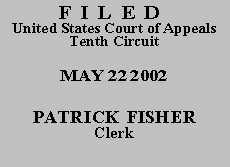

| UNITED STATES OF AMERICA,
Plaintiff - Appellee, v. RONALD WILLIAM SWALLOW, Defendant - Appellant. |
97-CR-181-M)
|
Appellant Ronald William Swallow appeals from the district court's denial of his motion to vacate, set aside, or correct his sentence filed pursuant to 28 U.S.C. § 2255. The district court ruled that appellant's only challenge to his sentencean attack on the validity of part of a restitution orderwas not a cognizable claim under § 2255 because the language of that statute limits relief "only to those prisoners who 'claim[] the right to be released' from custody." Rec. Vol. I, doc. 32, at 4 (quoting § 2255). Appellant now contends that this ruling is contrary to both published and unpublished decisions of this circuit. Aplt. Br. at 4.
To proceed on appeal before this court, appellant must obtain a certificate of appealability (COA), see 28 U.S.C. § 2253(c)(1)(B). The district court denied his motion for a COA, and he reurges his motion here. A COA will not issue unless appellant makes "a substantial showing of the denial of a constitutional right." Id. § 2253(c)(2). He can make such a showing by demonstrating that the issues he seeks to raise are debatable among jurists of reason or deserving of further proceedings. See Slack v. McDaniel, 529 U.S. 473, 484 (2000).
We conclude that appellant has not met the standards for the issuance of a COA. First, neither his arguments challenging the district court's interpretation of § 2255 nor his substantive challenge to the restitution order are of constitutional dimension, which is required by the COA standards set forth in § 2253(c)(2). See United States v. Gordon, 172 F.3d 753, 754 (10th Cir. 1999). Further, although there are no decisions by this court that address the availability of § 2255 to challenge a restitution order, all of the circuits that have addressed the issue agree that challenges to restitution may not be considered in § 2255 proceedings. See United States v. Kramer, 195 F.3d 1129, 1130 (9th Cir. 1999) (collecting cases). Therefore, appellant has not demonstrated that the issue is debatable among reasonable jurists, and he has not argued that it is deserving of further development.
Appellant's motion for a COA is DENIED and this appeal is DISMISSED.
Entered for the Court
Circuit Judge
*. This order and judgment is not binding precedent, except under the doctrines of law of the case, res judicata, and collateral estoppel. The court generally disfavors the citation of orders and judgments; nevertheless, an order and judgment may be cited under the terms and conditions of 10th Cir. R. 36.3.